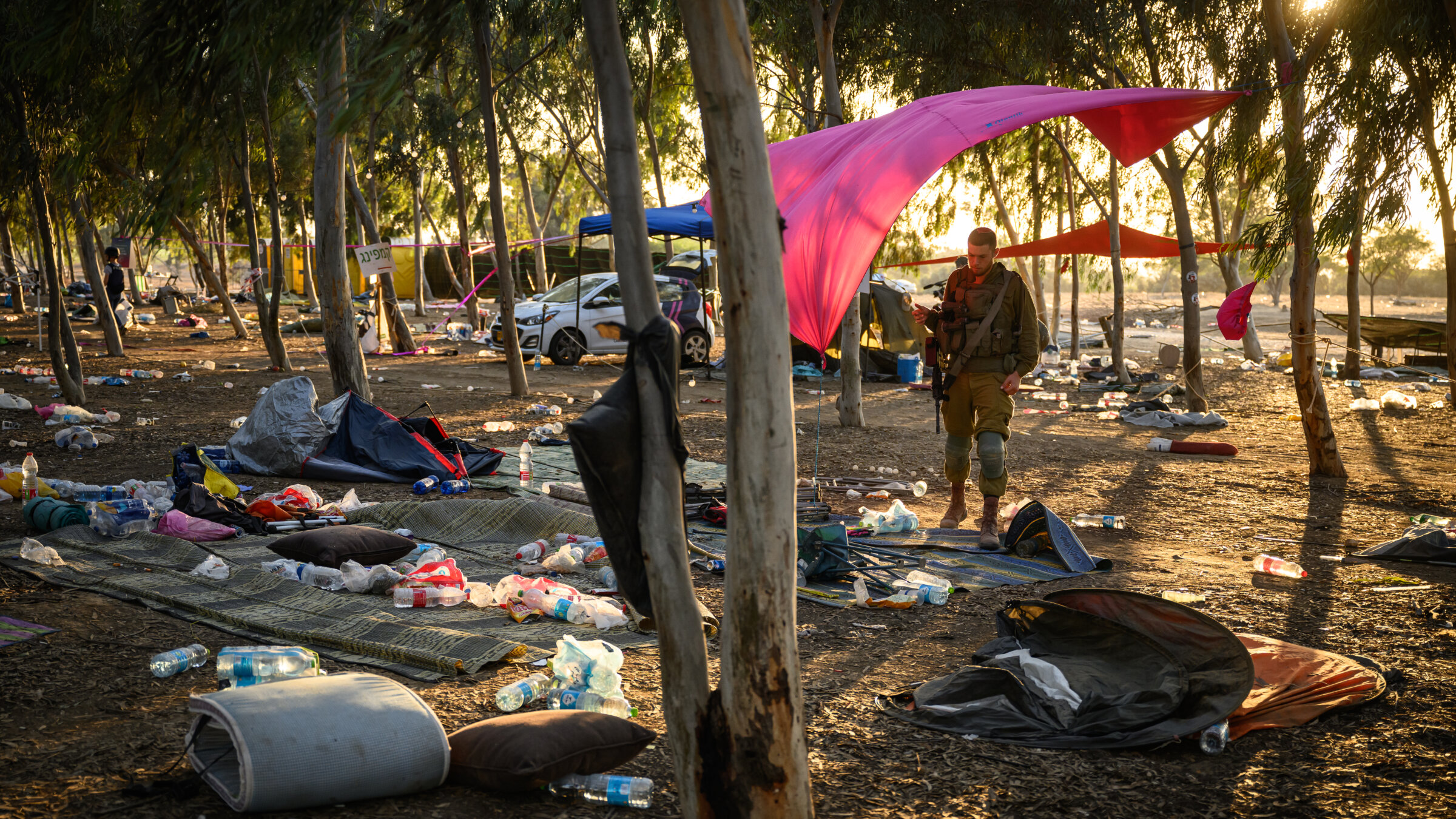How psychic numbing can limit comprehension of the Oct. 7 attacks
A psychological phenomenon that can close off the mind to suffering in Israel, Gaza or anywhere else

Members of Israeli security forces search for identification and personal effects at the Tribe of Nova music festival site, where 364 people were killed and dozens taken by Hamas militants. Photo by Leon Neal/Getty Images
More than two months after the Oct. 7 attacks in Israel, numerous groups are trying to bring more attention to what happened that day. Organizers are holding showings of horrific videos in which Hamas terrorists documented and celebrated their brutality. Activists are speaking out about the silence of women’s groups despite the mass sexual assaults that took place. William Daroff, head of the Conference of Presidents of Major American Jewish Organizations, told the Forward, “We must ensure that America and the entire world are told and retold the stories of the butchery of the Oct. 7 massacre.”
Antisemitism and conspiracy theories are leading some people to justify, diminish, or ignore the brutality of that day. But there’s also another psychological force at play that’s important to understand: psychic numbing, defined by the American Psychological Association as a phenomenon in which people’s minds are “weakened in or deprived of the power of feeling or moving.”
Researchers have explored psychic numbing, and found a startling paradox: The wider the scale of suffering, the more likely people are to develop numbness to it. “A photograph of one suffering child can transform public opinion about an issue. A photo of two suffering children, not so much,” the APA reported in 2020. “One life is valuable, but that life loses value, perceptually, if it is part of a larger tragedy,” University of Oregon psychology professor Paul Slovic told the APA in an interview.
Given that the “Black Shabbat” attacks included about 1,200 fatalities and 7,000 injuries — per capita, 15 times the size of the 9/11 attacks in the United States — psychic numbing may be leading people to turn away.
This same phenomenon applies to suffering elsewhere as well. It may be leading people to ignore suffering in Gaza, where the Hamas-run health ministry says more than 18,000 Palestinians have been killed, a magnitude that challenges comprehension.
In fact, given the unprecedented pace at which news of global horrors inundates us these days, we’re all more likely to develop psychic numbness than previous generations. In the Russia-Ukraine war, the casualty toll (including dead and wounded) may be as high as half a million. In Ethiopia, an estimated 600,000 civilians have been killed. From Darfur to Burma, atrocities abound. As updates flood our phones, our subconscious mind can lean toward numbing as a coping mechanism, shielding us from a profound emotional impact.
Some are surprised that the shocking personal barbarity of the 10/7 attacks hasn’t cut through that numbness, provoking greater compassion and interest. These attacks were unlike anything most people have imagined — entire families burned alive; terrorists carrying heads as trophies, cutting off a woman’s breasts and playing with them “like a toy.” This is different from what people are used to seeing in wars, such as bombed buildings and dead bodies. Still, the more people hear about how many people were killed, wounded or taken hostage that day, including babies and elderly Holocaust survivors, the more numbness might take hold.
This unsettling trend becomes even more apparent in the context of what is happening at universities, where some students and faculty have condoned and even celebrated the attacks. When leaders respond with silence or only minimal steps, their relative inaction signals institutional numbness. University leaders should stand firm, demanding that everyone, irrespective of their political stance, acknowledge and confront the gravest slaughter of Jewish people in a single day since the Holocaust.
Some fellow academics have criticized this moral ambiguity, and a viral video from the plain-spoken Phil McGraw highlighted that certain universities “are profoundly demagnetizing our culture’s moral compass among the college population.”
During Trump’s presidency, there was much talk about people becoming numb to lies. I warned of this in 2016, before he was even elected. By the next year, columnist Roger Cohen lamented in The New York Times the “terrifying” numbness of shrugging off Trump’s nonstop lies.
But numbness to truth can be just as insidious. As Dr. Richard F. Mollica and Thomas Hübl explained in a column for Harvard Health Publishing, through this kind of numbness “we lose our reflective capacity to be self-aware, which reduces empathy and compassion. Indifference and disconnection can contribute to further atrocities, fueling a feedback loop that makes new traumas more likely to occur.”
It’s imperative that we make a deliberate effort to collectively acknowledge the realities of 10/7, as well as the suffering in Gaza and everywhere else. To “bear witness” today means much more than just being a spectator. It includes communicating what we have seen, educating each other, and refusing to let people avert their gaze.
The stakes are high: By succumbing to numbness, we risk not only our awareness but also the very fabric of empathy that binds us.
To contact the author, email [email protected].
A message from our Publisher & CEO Rachel Fishman Feddersen

I hope you appreciated this article. Before you go, I’d like to ask you to please support the Forward’s award-winning, nonprofit journalism so that we can be prepared for whatever news 2025 brings.
At a time when other newsrooms are closing or cutting back, the Forward has removed its paywall and invested additional resources to report on the ground from Israel and around the U.S. on the impact of the war, rising antisemitism and polarized discourse.
Readers like you make it all possible. Support our work by becoming a Forward Member and connect with our journalism and your community.
— Rachel Fishman Feddersen, Publisher and CEO





























